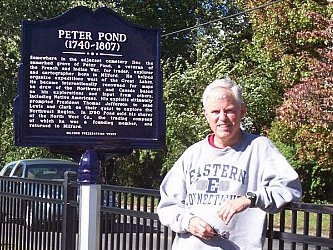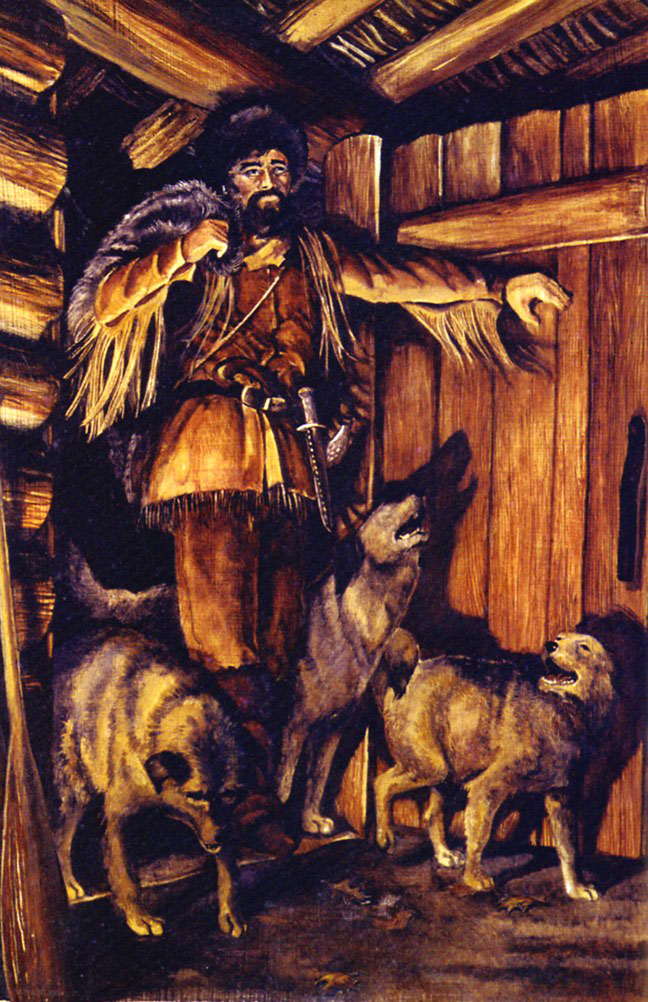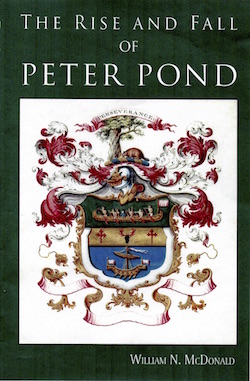Peter Pond newsletter :: April 2018 :: #50
HOW IS THE BOOK DOING?
All 100 copies of "The Rise and Fall of Peter Pond" are gone, at least from my possession. I gave away close to half of them and made some money on the rest. It took a while to get set up on Amazon and then all of a sudden they took my last 40 copies. People have told me they bought the book on Amazon (the American link, not the Canadian link sorry to say). So if there are still some of you who want it. Friends and family said they liked it. Here is a nice review by PPSer Barry Gough, retired Wilfrid Laurier University, Waterloo, Ontario, history professor, author of Dictionary of Canadian Biography article on Peter Pond as well as his own book on Peter Pond. I consider him the Canadian expert on our man.
William McDonald's The Rise and Fall of Peter Pond (2018), an Appreciation
ISBN 978 -1 -935356-59-2. $19.95; available from the author bmcdon25@optonline.net
By Barry Gough, author of The Elusive Mr Pond (2014)
The life of Peter Pond is one still surrounded in mystery. This is so despite several biographies having been written, two quite recently, that have thrown stark light on a person who might well be lost to history if it were not for the fact that he preceded others in so many ways: he imagined a northwest passage through the continent; he met many of the giant figures of the fur trade of the second half of the eighteenth century; and he was regarded by his contemporaries in the trade, or in businesses related to the trade in the pays d'en haut, that qualify him to be a person of significance.
No curious person examining the records of the fur trade of the era can fail to do one of two things: dismiss the material as too various and furtive to make into any sort of sensible narrative, or set forth courageously to piece together the fragments and make them into some sort of sensible whole. I contend that Pond is an elusive figure, and this despite all the material that has come forward down to our times. I am reminded of the fact that it was George Davidson who first unearthed the Pond materials in the British Museum Library and in The Public Record Office, London, and this long before Harold Innis gathered together scraps from the relevant Canadian files to put together his awkward 1930 biography. Still, not much new has been unearthed since Innis's time, and this is where creativity, insight and persistence come into play. And we are reminded of the fact that each generation must write its own history. David Chapin's Freshwater Passages: The Trade and Travels of Peter Pond (2014) is a splendid achievement.
There is enough distance now from Pond's time that we can make new appraisals and make some gallant attempts at getting at the inner Pond. So it was in this light that I was delighted to hear that William McDonald, of Milford, Connecticut, and a person who has done so much to keep alive Pond's story, or stories, had approached the life of Peter Pond.
There is an important, newer genre of writing known as creative non-fiction. It is not as well known as it should be. I first chanced on it when asked by the distinguished author Edna Staebler to sit on a judging panel to award the annual prize in Creative Non-Fiction (in her name) at my university, Wilfrid Laurier University, in Waterloo, Ontario. The genre, as I soon learned, involved the inspirational examination of historical details, including memoirs, letters and perhaps photographs, to re-create, so to speak, the life and /or times of a certain person. That prize soon became the premier one in Canada, and over the years I continued to be inspired by the number of adherents to the genre. In large measure, William McDonald's work on Peter Pond is in that category of literary work. He knows the actual life of his subject as well as any person, and, perhaps happily, he has not ambition to write the true life of Peter Pond. (In any case, the "true life" of Peter Pond might spoil the whole appreciation of an enigmatic person.)
McDonald has a strong cast of characters in his account – Samuel Hearne, Simon McTavish, Peter Pangman, and of course Alexander Mackenzie. Pond is shown as the genius behind the establishment of the Northwest Company of Canada. He is disclosed as a person whose reputation has preceded him. McDonald does not go overboard, happily, in discussing Pond's implication in the deaths of two rival traders, and it is fair to say that this has been overplayed by others. This was life on the wild frontier, after all. McDonald shows Pond to be a strong proponent of the Northwest Passage, connected to Captain James Cook's Pacific Ocean discoveries. Native persons come into the story, too, and these are principally females. Once again, McDonald does not exceed sensitivities here, and the relationships are seen as easy and natural, as indeed they were then – and ought to be better understood now. Pond did well out of the fur trade. All the same, the work was difficult and hazardous, the winters frightfully cold and lonely, and the hardships of travel beyond comprehension nowadays. This magical and distant past, now only of literary memory, needs to be kept alive. I kept thinking of Kenneth Roberts's books as I read McDonald's. Let us hope that McDonald's book helps throw light on a world we have lost, when fur was king and helped shape the course of the history of the northern North American continent, particularly that of Canada. Hats off to William McDonald for inspired examination of this distant time when angular figures like Peter Pond strode the historical stage.
HELPING CANADIAN PROFESSOR WILLIAM BUXTON
Here is another Canadian professor interested in Peter Pond I have been dealing with. William Buxton, professor of communication studies, Concordia University, Montreal, has written several books about Harold Innis, Peter Pond's original biographer in 1930. It seems Innis as an economist was also the inspiration for Marshall McLuhan's studying communication theory with the famous pronouncement "the medium is the message." I sought Buxton out and asked if he would like to included in my newsletter emailings on Peter Pond and he said yes. We have corresponded back and forth pretty regularly over the past several years swapping info on Peter Pond.
One notable time was when he was going through the Innis papers at University of Toronto (where a college has been named after him) and he found letters from a Peter Pond descendant, Florence Atherton Pond LeGrand Cannon, two in 1932 and one in 1935. Bill wondered if I could find any letters from Innis to Florence from my end. I knew that Florence's son, LeGrand, had given Peter Pond's narrative to Yale University in 1947 so I believe she possessed it before that. Apparently it had been handed down through family members from the time it was written. I had met some family members connected to the Cannons and was directed to Catherine Burns, 81, of Berlin, VT who had inherited Florence's writings. She had never really gone through them so I asked her if she could and she turned up three letters from Innis, handwritten and hard to read. One notable thing was she had told him she possessed Peter Pond's Beaver Club medal and he was quite interested to learn that. The medal is still in private hands. He was also thanking her for sending copies of the narrative to him and another to the Minnesota Historical Society which had somehow learned she had it. There were also two pamphlets written by Innis, one on the influence of Capt. James Cook finding an inlet on the Alaskan coast that he thought was the outlet of the Northwest Passage. Another was on Peter Pond's general interest in looking for a Northwest Passage.
Catherine actually mailed these originals to me (noting she had no interest in them) which I copied and passed on to Buxton. Buxton was quite happy, calling it a "great find" and that he would add it to the Innis papers at UofT. I sent both Catherine and Bill free copies of my book.
AREA KNOWN AS PETER POND, SASKATCHEWAN
I had a news article about the book appear in the Prince Albert Daily Herald in early January and was able to sell three copies that way. One email was from a man who didn't want the book but said something worth repeating.
"Hi Bill, I live about 2 miles from the monument on the shores of the North Saskatchewan. If you would like me to send you a photo of it, just let me know. They actually call this area "Peter Pond". Back when I had a land phone line, that is what my location was listed as.
Yours Truly, Peter Hoemsen"

Au revoir,
Bill
website design by Daniel Ortoleva

